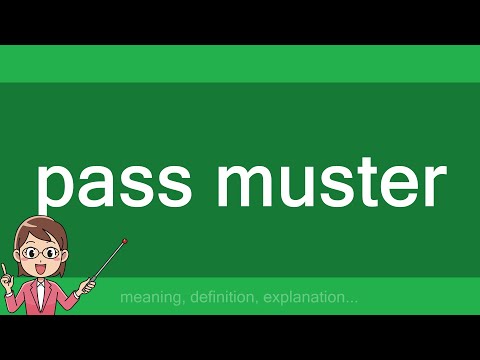
Understanding ‘Pass Muster’: Military Origins and Cultural Implications
Ever hear someone say they need to “pass muster”? If you’ve ever wondered what that means, you’re not alone. This phrase signifies the act of being tested or evaluated against specific standards. It hails from military practices where soldiers would routinely undergo inspections to ensure they were fit for duty. The term invokes images of troops lining up for a formal inspection, either before heading off to battle or after a harrowing mission.

What Does it Mean to ‘Pass Muster’?
The phrase “pass muster” carries a deep history that extends beyond mere inspections. Originally, it referred to officers assessing their soldiers, checking their uniforms, and confirming they were mentally and physically ready for combat. When a soldier would “pass muster,” they met the commander’s expectations—essentially giving a thumbs-up for their readiness.
What’s fascinating about “pass muster” is that it accentuates a societal expectation for accountability and excellence, not just in military settings but also across civilian life.
The Evolution of ‘Pass Muster’ in Military Context
The term ‘muster’ is derived from the Latin word monstrare, which means “to show” or “to demonstrate.” Its military connotations became popular during the 17th century, especially during wars like the English Civil War. Commanders would conduct musters to gauge troop capabilities, readiness assessments, and even morale. These evaluations were crucial for battlefield planning, shaping the strategies that would determine the outcome of skirmishes and wars.
Fast forward to today, “pass muster” in a military sense remains ever-relevant. Take, for instance, the U.S. Armed Forces, where soldiers routinely undergo readiness drills that assess their capabilities and prepare them for deployment. When military personnel “pass muster,” it signifies a high standard, one that’s vital for their success in both training and combat situations.

Top 5 Instances Where ‘Pass Muster’ Became a Cultural Touchstone
Let’s explore how “pass muster” has transcended military jargon and become part of various facets of life.
1. The US Armed Forces: Readiness Checks
In modern times, the U.S. Armed Forces rigorously execute readiness drills to ensure all personnel pass muster. Annual drills within the National Guard test soldiers on various assessments. Failing to pass means potential setbacks in deployment, which can significantly affect military operations.
2. Corporate Culture: Employee Evaluations
In corporate America, “passing muster” often translates to employee performance evaluations. Take companies like Amazon, where employees face data-driven assessments that match their efficiency against set standards. Google follows suit, pushing employees to innovate. In these competitive environments, workers must continuously pass muster to climb the corporate ladder.
3. Sports: Athletic Tryouts
The concept of “pass muster” isn’t limited to military or business contexts; it has made its mark in sports as well. For instance, during the NFL Draft Combine, aspiring athletes undergo a barrage of physical and mental tests. Their adeptness determines their chance to don a professional jersey. When players pass muster, they shift from hopefuls to professionals—talk about the pressure!
4. Entertainment: Auditioning Process
In Hollywood, every actor knows the importance of being able to pass muster at auditions. Major casting directors, including those for franchises like Marvel, scrutinize performers with exacting standards. A successful audition could catapult an actor to stardom, while failure means returning to the drawing board.
5. Education: Academic Standards
Academic institutions utilize the concept of ‘passing muster’ to uphold educational standards. Take Ivy League schools like Harvard and Yale; their admissions processes are known for their rigor. Prospective students must “pass muster” through academic excellence, extracurricular activities, and compelling personal essays. The competition there is fierce, underscoring how the bar is set high for academic achievements.

Exploring the Broader Cultural Impact of ‘Pass Muster’
The phrase “pass muster” has woven itself into the very fabric of our society. Its resonance cuts through various domains, from business to education and entertainment. The expectation of meeting high standards encourages individuals and organizations to continuously raise the stakes.
In a world where both personal and professional achievements matter, “passing muster” becomes a universal benchmark for success. Society tends to view it as an indicator of competence, commitment, and potential, shaping our collective ambition to pursue excellence in everything we undertake.
Final Thoughts on the Significance of ‘Pass Muster’
As we peel back the layers of the phrase “pass muster,” its military origins remind us that it stands for more than just meeting standards. It reflects a cultural ethos striving for improvement across various sectors of life.
Whether in the military, corporate boardrooms, sports arenas, audition rooms, or hallowed academic halls, the relentless push to “pass muster” illuminates our shared journey towards validation and achievement. Life’s challenges may change, but the pursuit for excellence remains a steadfast human endeavor. As we move forward, let’s remember the past and how it shapes our drive to continually exceed expectations—because after all, passing muster has become a testament to our unyielding quest for success in an ever-demanding world.

Pass Muster: Fun Trivia and Interesting Facts
The Origin of the Phrase “Pass Muster”
The term “pass muster” has roots deep in military tradition. Originally, it referred to soldiers passing inspection, where they demonstrated their readiness for service. If a soldier failed to meet the expected standards, they simply wouldn’t be allowed to join their comrades. This phrase still has a use today; if something doesn’t “pass muster,” it means it fails to meet a certain criteria. Interestingly, while “pass muster” is serious business in the military, it’s often used humorously in everyday life! For instance, how fitting is it that in theaters, those in the nosebleed seats can still witness the action, reinforcing the idea that perspective matters? Speaking of different views, check out the diverse experiences of characters from shows like the Drew Carey show cast, who had their own life lessons, albeit in more comedic and lighthearted circumstances.
From Inspections to Everyday Use
Beyond its military roots, the usage of “pass muster” has infiltrated everyday language, much like those dreaded biweekly mortgage Payments that can sneak up on homeowners. It’s fascinating how a phrase rooted in battle strategy has managed to adapt seamlessly into modern vernacular. To appreciate its evolution, consider the term plebe, which evolved from its exclusive military origins to refer to newcomers in various contexts. This transition reflects how language often shifts. Whether you’re looking for a no down mortgage deal or just trying to keep your friends entertained, the adaptability of expressions speaks volumes about our culture.
The Modern Implications of “Pass Muster”
On a lighter note, the phrase connects with contemporary challenges, just like trying to enjoy movies that might seem overly complicated—like the concept of a Pornover that leaves you scratching your head. There are expectations everywhere, and this phrase serves as a reminder that meeting standards can lead to acceptance, whether in social circles or entertainment industries—Aretha Wilson certainly made waves in film with her striking presence, passing muster through talent alone. The bottom line? Whether it’s on the battlefield or in the crowded arena of life, we’re all trying to pass muster in our unique ways. So, what can you bring to the table today?

What does it mean to pass muster?
To pass muster means to meet a required standard or to be good enough for what’s needed. If something doesn’t pass muster, it’s been judged as inadequate or not up to scratch.
Where did the saying “pass muster” come from?
The saying “pass muster” has its roots in the military, referring to a formal assembly or inspection where troops are checked for readiness. The term reflects the expectation that soldiers will measure up to certain standards when lined up for review.
Is it pass muster or cut the mustard?
Both “pass muster” and “cut the mustard” are correct phrases, but they have different meanings. “Pass muster” is all about meeting standards, while “cut the mustard” often refers to someone’s ability to perform as expected.
What is a muster?
A muster refers to the act of assembling troops, especially for a formal military inspection. It can also mean the group of people assembly for that purpose.
Why does the Navy call it muster?
The Navy calls it muster because it’s the term used for gathering personnel for roll call or inspections, ensuring everyone’s present and accounted for.
What does fail to pass muster mean?
Failing to pass muster means that something or someone has not met the necessary standards or requirements, often leading to rejection or disapproval.
What does muster mean in the Marines?
In the Marines, muster signifies both the assembly of troops for inspection and the accountability of personnel, making sure everyone is where they’re supposed to be.
What does “don’t cut the mustard” mean?
“Don’t cut the mustard” means that someone or something isn’t meeting expectations or isn’t good enough to succeed in a situation.
What is a legal muster?
A legal muster is a formal process or gathering, usually involving a review or examination of a group, often with legal or regulatory implications that could affect permissions or licenses.
Why is it called cut the mustard?
The phrase “cut the mustard” likely refers to the idea of matching up to a certain level of quality or performance, although the exact origin isn’t clear.
What is the British slang mustard?
In British slang, “mustard” is often used to mean something excellent or first-rate, as in something that’s really impressive or effective.
Where did Too Old to Cut the mustard come from?
The phrase “Too Old to Cut the Mustard” comes from a song published in the 1920s, suggesting that someone has outlived their usefulness or can’t meet expectations anymore.
What does passes muster mean?
When someone says something “passes muster,” it simply means it’s met the necessary criteria and is deemed satisfactory or acceptable.
What does muster mean in jail?
In jail, muster refers to the roll call or gathering of inmates to account for everyone, making sure all are present during checks.
What is a peacock muster?
A peacock muster is a term used for when male peacocks display their feathers to attract mates, symbolizing a showy or impressive gathering, though it might have different meanings in various contexts.



























